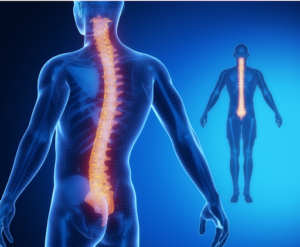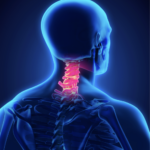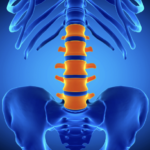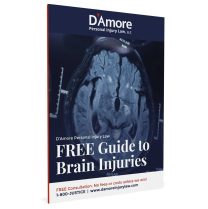D'Amore Personal Injury Law, LLC
Serious Injury Lawyers Proudly Serving
Baltimore, Annapolis, & Washington, D.C.
Maryland Spinal Cord Injury Attorneys
Spinal Cord Injuries
Spinal cord injuries (SCIs) involve damage to the spinal cord that result in a change, either temporary or permanent, in the cord’s normal motor, sensory, or autonomic function. These injuries can be traumatic or non-traumatic and can vary in severity. Here are the main types of spinal cord injuries:
1. Complete Spinal Cord Injury:
– This type of injury results in a total loss of sensation and muscle function below the level of the injury.
– The individual will not have any function below the level of the injury, meaning they cannot move or feel sensations even if the nerves are not severed.
2. Incomplete Spinal Cord Injury:
– There are various syndromes associated with incomplete injuries, including:

– Central Cord Syndrome: Damage is centrally located and often results from trauma. It affects the arms more than the legs.
– Anterior Cord Syndrome: Damage to the front of the spinal cord, resulting in impaired temperature, touch, and pain sensations.
– Brown-Séquard Syndrome: Damage to one side of the spinal cord, leading to paralysis on the injured side and loss of temperature and pain sensation on the opposite side.
– With this type of injury, there is some function below the level of the injury.
– The degree of function depends on the nature and severity of the injury.
3. Tetraplegia (or Quadriplegia):

– This results from injuries to the cervical (neck) region of the spinal cord.
– It affects both the arms and legs. Depending on the level of injury, it may also affect the chest and abdominal muscles.
4. Paraplegia:
– This results from injuries to the thoracic (mid-back), lumbar (lower back), or sacral (hip) regions of the spinal cord.
– It affects all or part of the trunk, legs, and pelvic organs.
5. Cauda Equina Lesion:

-The cauda equina is a bundle of nerve roots located at the lower end of the spinal cord.
– Injuries here can result in partial or complete loss of sensation. It may also affect motor function in the lower part of the body.
6. Triplegia:
– This is a less common type of SCI where three limbs are affected. It usually results from an incomplete spinal cord injury.
7. Non-Traumatic Spinal Cord Injury:
– These injuries are caused by diseases or disorders rather than trauma. Examples include tumors, infections, or degenerative disc disease.
It’s important to note that the severity and outcome of spinal cord injuries can vary widely depending on the location and extent of the injury. Immediate medical attention and rehabilitation are crucial for the best possible recovery.
When does Medical Malpractice lead to Spinal Cord Injury?
Medical malpractice occurs when a healthcare professional, through a negligent act or omission, causes injury or harm to a patient. Here are some ways that medical malpractice can result in a spinal cord injury:
– Mistakes during surgery that directly damage the spinal cord.
– Incorrect surgical procedures or techniques used during spine surgery.
– Failure to stabilize the spine during surgery.
– Failure to promptly diagnose and treat conditions like tumors, infections, or spinal cord compression can lead to permanent damage.
– Misinterpreting or failing to order appropriate diagnostic tests, such as MRIs or CT scans.
– Incorrect administration of anesthesia during surgeries involving the spine or nearby areas.
– Failure to monitor a patient’s vital signs during surgery, leading to reduced blood flow to the spinal cord.
4. Improper Handling of Spinal Cord Trauma:
– Inadequate immobilization of a patient with a suspected spinal injury, which can exacerbate the injury.
– Failure to promptly refer a trauma patient to a specialized center for spinal injuries.
– Emergency rooms are sometimes very busy and chaotic.
– Full attention isn’t given or a medical professional is distracted, the likelihood of mistakes increases.
– If a doctor doesn’t take enough time with a spinal fracture patient or broken back, the patient may be misdiagnosed and not receive the proper treatment.
– Another common ER mistake is not immobilizing a patient’s neck and head or moving the patient incorrectly when there is a spinal injury.
6. Inadequate Post-Operative Care:
– Failure to monitor and address potential post-surgical complications that can impact the spinal cord, such as infections or hematoma formation.
7. Errors during Spinal Injections:
– Mistakes during procedures like epidural injections or lumbar punctures can injure the spinal cord.
– If a chiropractor doesn’t perform treatment correctly, it can result in spinal cord trauma occurring.
– Improper use of forceps or vacuum extractors during childbirth, or excessive force during delivery, can injure the baby’s spinal cord.
10. Failure to Monitor Spinal Cord Diseases:
– Not adequately monitoring or treating progressive diseases that can impact the spinal cord, such as certain types of arthritis or degenerative disc disease.
It is essential to understand that not all adverse outcomes or complications from medical treatments are due to malpractice. For an incident to be considered medical malpractice, it must be proven that the healthcare professional’s actions or omissions deviated from the accepted standard of care and that this deviation directly resulted in harm or injury to the patient.
Clients Lives We've Helped Rebuild
He lost his ability to walk
"The Best Lawyer"
Consult with a Medical Malpractice Attorney Today
If you or a loved one has suffered a spinal cord injury due to medical malpractice, you should consult a medical malpractice lawyer who can help you recover compensation for your pain, suffering, medical bills and lost wages.
Do not hesitate to contact the spinal cord injury lawyers at D’Amore Personal Injury Law today for a free case review. Remember, you and your loved ones deserve prompt and accurate medical treatment from the doctors you trust with your care.
Learn more about what to do after a Brain & Spinal Cord Injury in our FREE guide.
FREE Case Consultation
Fill out the form below and we will contact you.
Or, give us a call at
